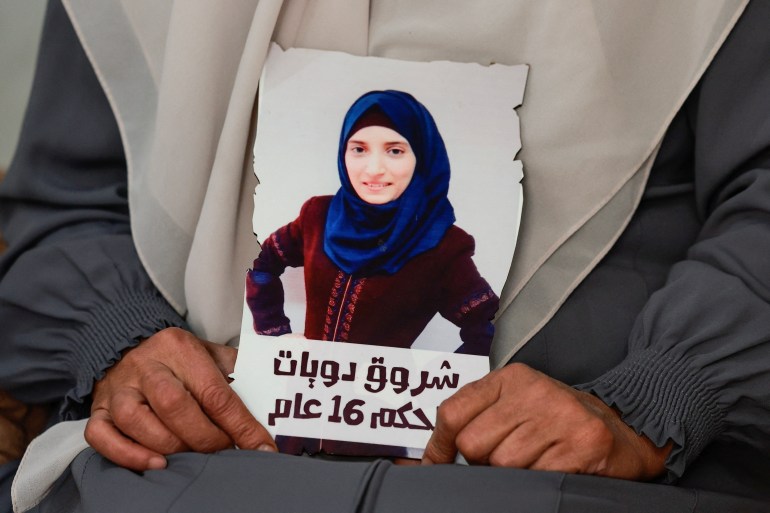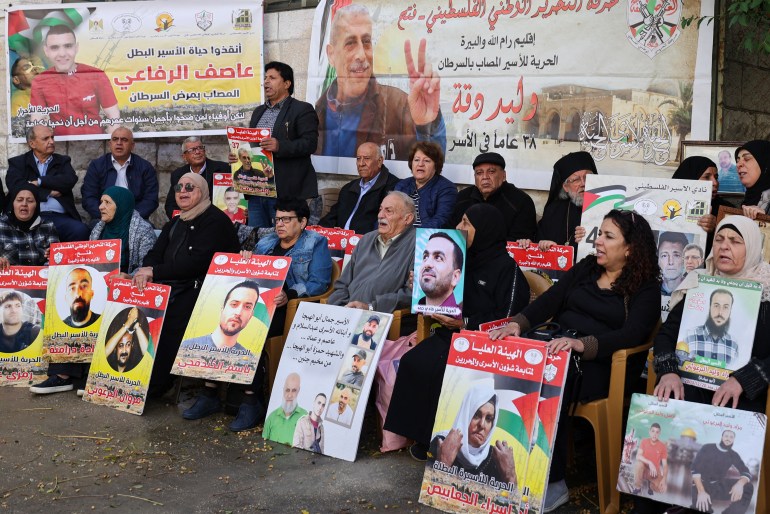At her home in the occupied East Jerusalem town of Sur Baher, Sameera Dwayyat is gripped with anxiety and apprehension.
The name of her daughter, Shorouq, who is currently serving the longest sentence of all the female Palestinian prisoners in Israeli jails, is on the list of prisoners due for release over the next few days in exchange for 50 Israeli captives held in Gaza by Hamas.
“I’m so nervous,” Sameera, also known as Imm Ibrahim, told Al Jazeera. “We haven’t heard confirmation about the names [to be released] from any official side, and neither the Red Cross nor the Palestinian Prisoners Club have contacted us.”
After six weeks of fighting, Israel and Hamas have agreed to a four-day truce that will begin on Thursday.
As part of the truce, Israel has agreed to release 150 Palestinian women and children from its prisons, in exchange for Hamas releasing 50 Israeli women and children out of the 237 captives abducted since October 7.
Hundreds of trucks carrying vital humanitarian aid and fuel will also be allowed into Gaza.
Shorouq Dwayyat, who is currently serving her ninth year of a 16-year sentence, is one of many prisoners who campaigners say have been unjustly tried and sentenced on unfair or fabricated charges. She was also fined 80,000 shekels ($21,500).
She was just 18 years old when Israeli forces arrested her as she was walking home on October 7, 2015 after they shot her four times, leaving her in critical condition.

She was accused of attempting to stab an Israeli settler with a knife, but her family strongly refutes the charges.
“It is impossible for me to believe the Israeli story that my daughter stabbed a settler,” Salah Dwayyat, her father, told Al Jazeera at the time. “Shorouq is delicate and cannot harm an animal.”
Palestinian witnesses said an Israeli settler had tried to pull off her hijab while she was walking past, in a deliberate act of provocation. She pushed back and Israeli forces fired four bullets into her body, leaving her to bleed on the ground for half an hour before arresting her.
Shorouq was treated at the Ein Karem/Hadassah Hospital in Jerusalem, undergoing skin grafts and several operations. She had just started her first semester at Bethlehem University as a geography and history student, after obtaining a 90 percent average in her high school results.
“She would be the one to lift my spirits up whenever I would visit her in Damon prison in Haifa,” her mother said. “I had no hope that she would be released early, to the point where she had stopped asking me if I thought there was a chance of that.”
The fifth child of seven, Shorouq would ask about her siblings, two of whom have married during the years she has spent in prison, and the nieces and nephews that she could not meet.
“This year – call it a mother’s intuition – I had a feeling she would be free,” Sameera said. “I told her during my last visit that I can see her at the front door of our home.”
“I hope it will be true,” she added, her voice catching. “I hope she can come home.”
‘They wanted revenge on my family’
In the northern occupied West Bank town of Sila al-Harthiya, Muntaser Jaradat said he cannot wait for his mother, Awatif, to be released from Damon prison in northern Palestine.
The 33-year-old was himself released from the notorious Naqab prison on November 1, but two other brothers remain in other prisons.
Awatif Jaradat, 50, was arrested in December 2021 after Israeli forces arrested her youngest son, Ghaith, who was 18 at the time. Another son, Omar, 21 was also arrested – as was Muntaser himself two months later.
Israeli forces had accused Ghaith of carrying out an attack that resulted in the death of an Israeli settler and the injury of two others. He was sentenced to life in prison plus 50 years.
“Israel accused my mother of incitement after she spoke to media saying that she was proud of her sons for resisting the occupation,” Muntaser said. “They wanted a lengthy sentence for her, nine to 15 years in prison.”
“They just wanted revenge on our family,” he said.

The mother of nine is known for her strong personality, especially in the face of adversity, her son said. Muntaser said that she acted as a medical chaperone for a fellow prisoner, Fatima Shaheen, who was arrested last April after Israeli forces shot her, resulting in wounds that left her paralysed. Shaheen is also on the list of female prisoners due to be released.
Awatif was allowed to accompany Shaheen to Ramleh prison for medical treatment, but was not allowed to stay with her. Instead, she was placed three months in solitary confinement at Ramleh, with no communication with the outside world, before being returned to Damon.
“The past two years have been hard for my family, who had to travel to four different prisons to see me in Naqab, Ghaith in Nafha, Omar in Gilboa and my mother in Damon,” Muntaser said. “We have had no word about Omar for two months.”
He described how Palestinian prisoners had been subject to torture following the Hamas attack on Israeli army outposts and towns outside the Gaza Strip on October 7.
“They would beat us so severely, that the ground would be stained with streaks of blood,” he said. “It was like being in Guantanamo Bay or Abu Ghraib prison. They humiliated us and would stomp on us with their boots. They also cut off water and electricity and threw away our belongings.”
In Bethlehem, Amna Salameh is optimistic about having her youngest daughter Maysoon Mousa back home after almost nine years in prison. Maysoon was arrested in 2015 when she was 22 years old and sentenced to 15 years in prison after being accused of stabbing a soldier.
“We’re happy to hear the news,” she said. “I last saw Maysoon two months ago, but since October 7, we haven’t been allowed visits and we heard that the prisoners are being mistreated badly. We hope all the prisoners will be released and the suffering of our people in Gaza will stop.”
This post was originally published on this site be sure to check out more of their content.








